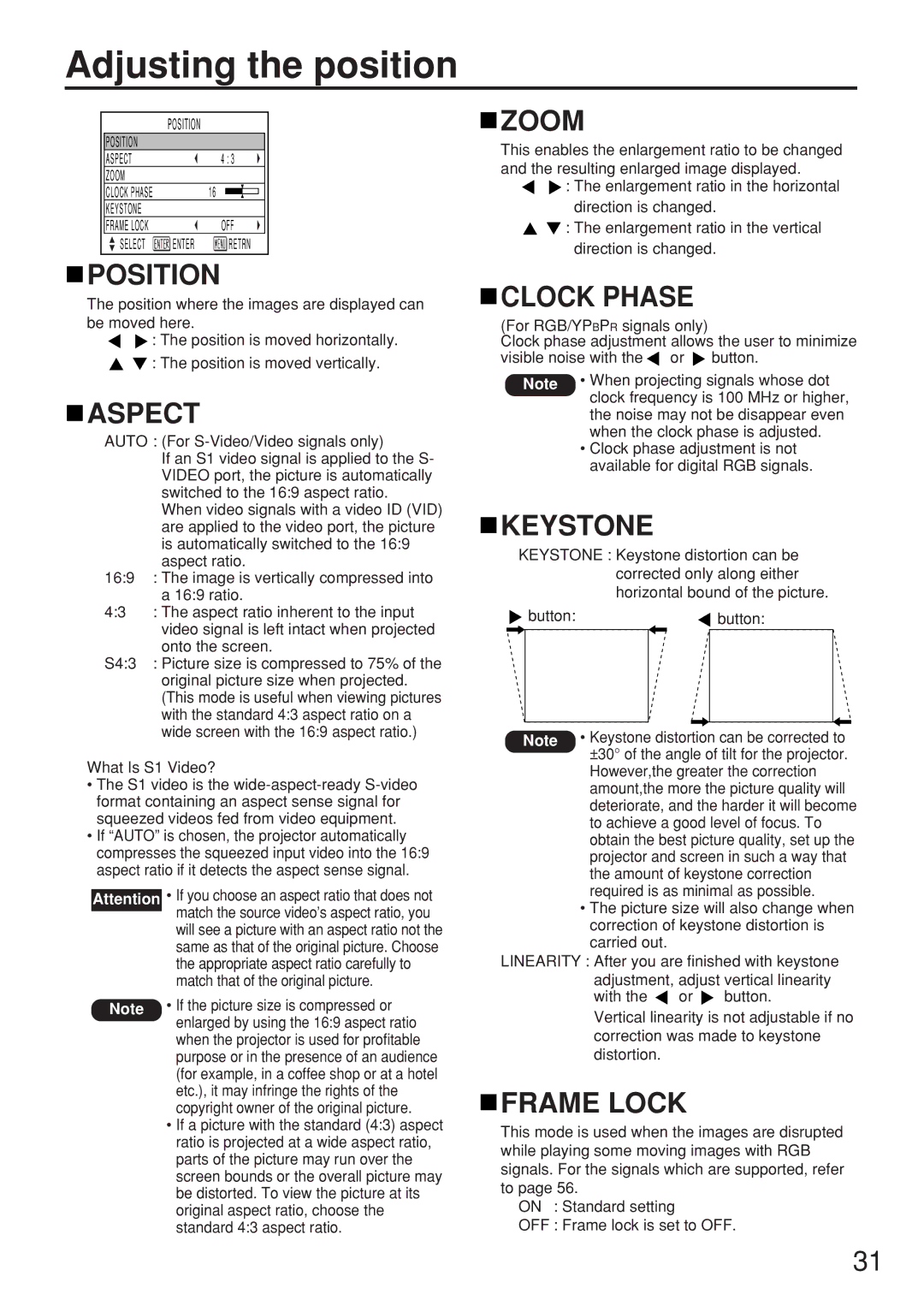
Adjusting the position
|
|
|
|
|
|
| POSITION |
|
|
|
|
|
| POSITION |
|
|
|
|
|
|
|
|
|
|
|
| ASPECT |
|
|
|
|
|
| 4 : 3 |
|
| ||
| ZOOM |
|
|
|
|
|
|
|
|
|
|
|
| CLOCK PHASE |
|
|
|
|
|
| 16 |
|
|
|
|
|
|
|
|
|
|
|
|
|
|
| ||
| KEYSTONE |
|
|
|
|
|
|
|
|
|
|
|
| FRAME LOCK |
|
|
|
|
|
| OFF | ||||
| SELECT |
|
|
|
|
| ENTER |
|
| RETRN | ||
|
|
|
|
|
|
|
| |||||
|
|
|
|
|
| |||||||
 POSITION
POSITION
The position where the images are displayed can be moved here.
![]() : The position is moved horizontally.
: The position is moved horizontally. ![]() : The position is moved vertically.
: The position is moved vertically.
 ASPECT
ASPECT
AUTO : (For
If an S1 video signal is applied to the S- VIDEO port, the picture is automatically switched to the 16:9 aspect ratio.
When video signals with a video ID (VID) are applied to the video port, the picture is automatically switched to the 16:9 aspect ratio.
16:9 : The image is vertically compressed into a 16:9 ratio.
4:3 : The aspect ratio inherent to the input video signal is left intact when projected onto the screen.
S4:3 : Picture size is compressed to 75% of the original picture size when projected. (This mode is useful when viewing pictures with the standard 4:3 aspect ratio on a wide screen with the 16:9 aspect ratio.)
What Is S1 Video?
•The S1 video is the
•If “AUTO” is chosen, the projector automatically compresses the squeezed input video into the 16:9 aspect ratio if it detects the aspect sense signal.
Attention • If you choose an aspect ratio that does not match the source video’s aspect ratio, you
will see a picture with an aspect ratio not the same as that of the original picture. Choose the appropriate aspect ratio carefully to match that of the original picture.
Note • If the picture size is compressed or enlarged by using the 16:9 aspect ratio when the projector is used for profitable purpose or in the presence of an audience (for example, in a coffee shop or at a hotel etc.), it may infringe the rights of the copyright owner of the original picture.
•If a picture with the standard (4:3) aspect ratio is projected at a wide aspect ratio, parts of the picture may run over the screen bounds or the overall picture may be distorted. To view the picture at its original aspect ratio, choose the standard 4:3 aspect ratio.
 ZOOM
ZOOM
This enables the enlargement ratio to be changed and the resulting enlarged image displayed.
![]() : The enlargement ratio in the horizontal direction is changed.
: The enlargement ratio in the horizontal direction is changed.
![]() : The enlargement ratio in the vertical direction is changed.
: The enlargement ratio in the vertical direction is changed.
 CLOCK PHASE
CLOCK PHASE
(For RGB/YPBPR signals only)
Clock phase adjustment allows the user to minimize
visible noise with the ![]() or
or ![]() button.
button.
Note • When projecting signals whose dot clock frequency is 100 MHz or higher, the noise may not be disappear even when the clock phase is adjusted.
•Clock phase adjustment is not available for digital RGB signals.
 KEYSTONE
KEYSTONE
KEYSTONE : Keystone distortion can be corrected only along either horizontal bound of the picture.
![]() button:
button:![]() button:
button:
Note • Keystone distortion can be corrected to ±30° of the angle of tilt for the projector. However,the greater the correction amount,the more the picture quality will deteriorate, and the harder it will become to achieve a good level of focus. To obtain the best picture quality, set up the projector and screen in such a way that the amount of keystone correction required is as minimal as possible.
•The picture size will also change when correction of keystone distortion is carried out.
LINEARITY : After you are finished with keystone adjustment, adjust vertical linearity
with the ![]() or
or ![]() button.
button.
Vertical linearity is not adjustable if no correction was made to keystone distortion.
 FRAME LOCK
FRAME LOCK
This mode is used when the images are disrupted while playing some moving images with RGB signals. For the signals which are supported, refer to page 56.
ON : Standard setting
OFF : Frame lock is set to OFF.
31
